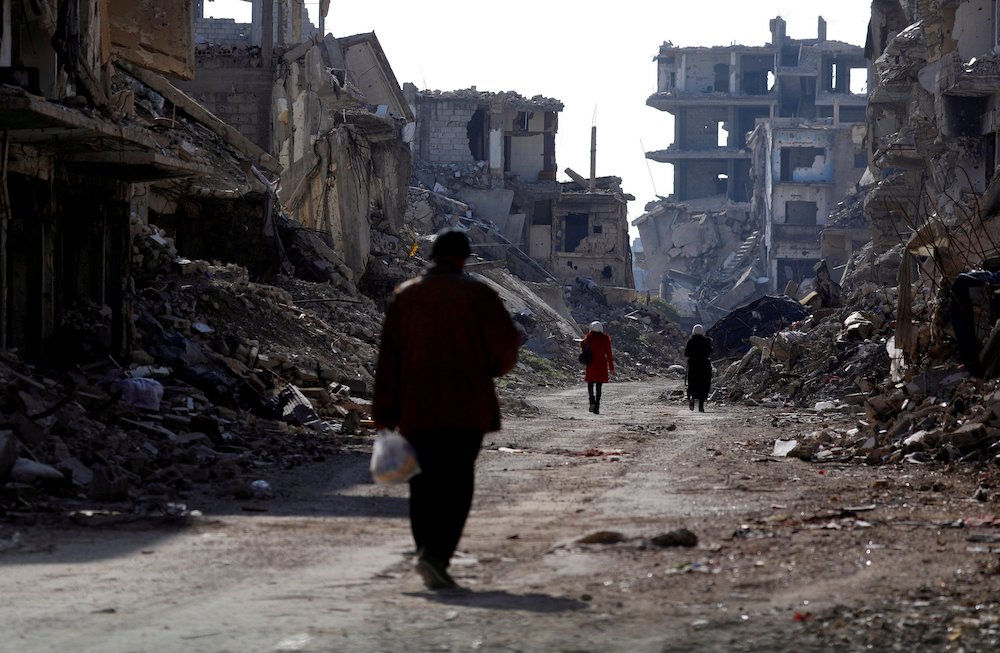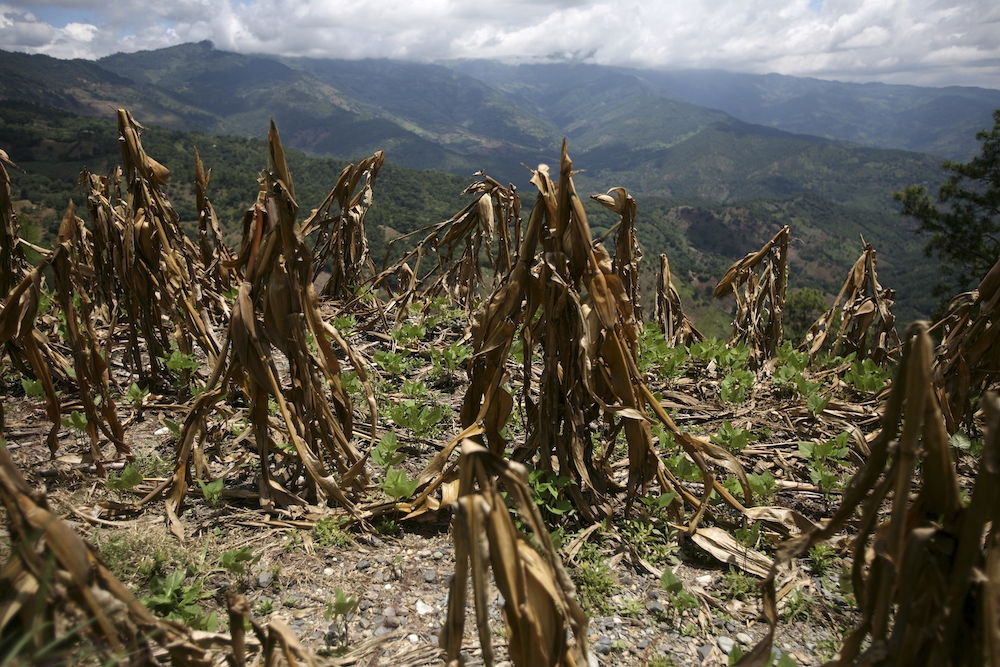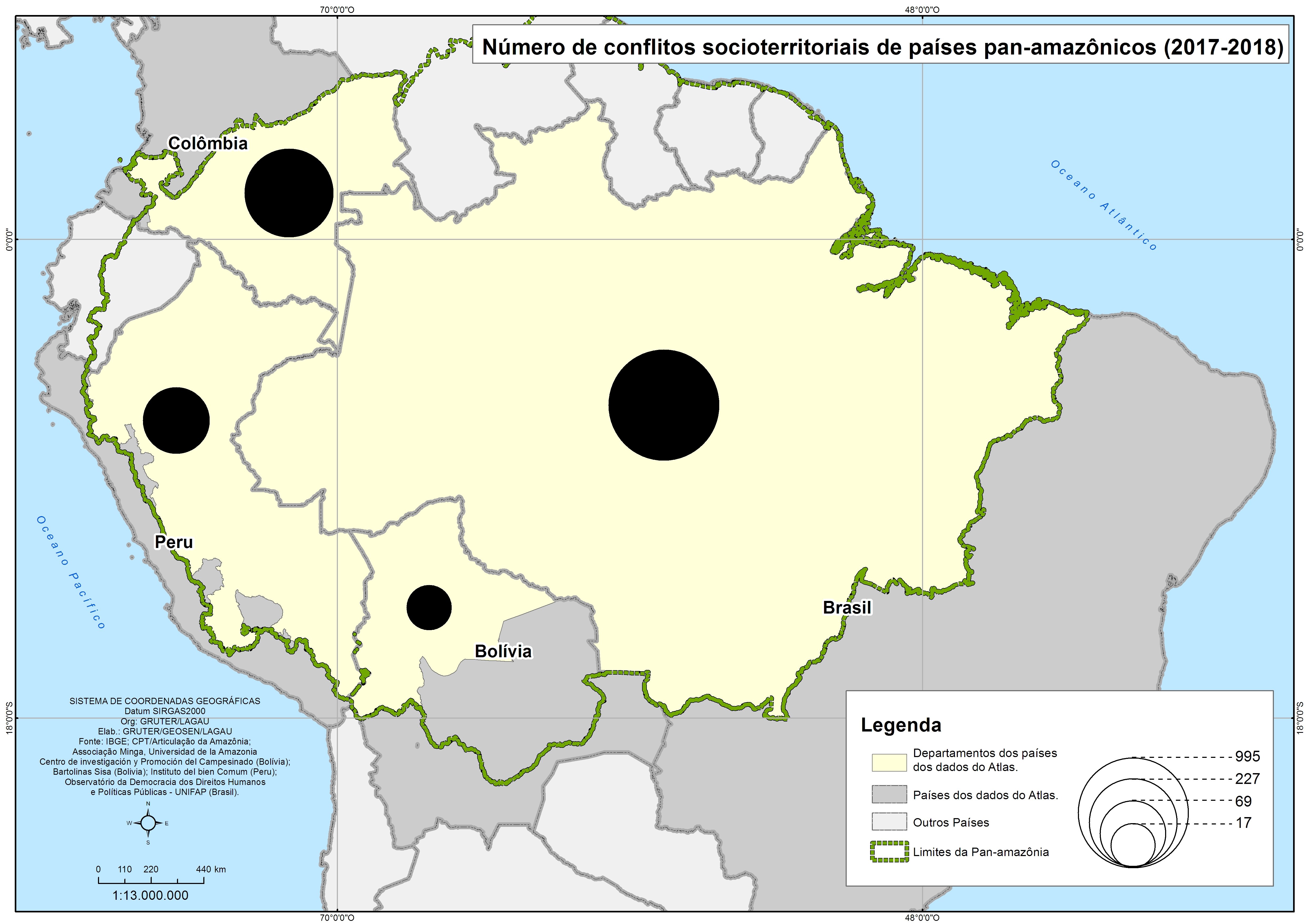Displaced Somali women from drought hit areas wait to fill their containers at a water filling station April 3, 2017, at a camp in Dollow, Somalia. (CNS/Reuters/Zohra Bensemra)
By now it's well understood that climate change leads to rising seas and rising temperatures. It is also increasingly linked to rising conflicts.
In 2014, the Pentagon issued a major report that referred to climate change as both posing "immediate risks to U.S. national security" and being "a 'threat multiplier' because it has the potential to exacerbate many of the challenges we are dealing with today — from infectious disease to terrorism."
Last year, Stanford University convened a group of top climate scientists, political scientists, economists and historians to examine the degree to which climate change has exacerbated conflicts in the past century. While it concluded that climate has had a limited effect on conflicts to date — less than factors like low socioeconomic development, weak governments and social inequalities — their study projected that warming of 2 degrees Celsius and beyond will substantially increase the risk of armed conflict.
"War is the negation of all rights and a dramatic assault on the environment," Pope Francis tweeted on Nov. 6, the United Nations-designated International Day for Preventing the Exploitation of the Environment in War and Armed Conflict. He added that true integral human development must work to avoid all wars.
Religious communities have a critical role to play in mitigating and resolving violent conflict stemming from rising global temperatures, says Karenna Gore, founder and director of the Center for Earth Ethics at Union Theological Seminary, in New York City.
In October, Gore received the 2020 Faith-in-Action Award from the International Center for Religion & Diplomacy (ICRD) for her work on how faith communities can both promote stewardship and preempt violent outbreaks.
EarthBeat recently spoke with Gore and James Patton, ICRD president and CEO, about the role of religion in mitigating and resolving violent conflicts fueled by climate change.
This interview has been edited for length and clarity. (The full interview is available in the video at the top of the page or by clicking here.)
EarthBeat: The U.S. Pentagon calls climate change a "threat multiplier." What does that mean with regard to violent conflicts?
Patton: It's not really just about sea level rise and different temperatures in different places in the world. If the sea does rise a meter, it will put a billion people on the move, and those people go to places that are already economically stressed. And oftentimes, that causes clashes [over resources] between groups of migrants and the host communities that they land in.
Then you add to that changes in rainfall patterns, seasonal glacial melt and how that affects fresh water availability, crop viability, high heat, increased winds, drier conditions contributing to wildfires. All of these things have an incredible impact on water and food availability, on livelihoods, on infrastructure. And that pushes people — usually people who are already economically disadvantaged — to struggle with one another over scarce resources.
When they do that, it very easily manifests in the kind of identity conflict that ICRD works on. People start to scapegoat one another around things like their tribes, their ethnicity, their faith. You see this oftentimes with migrant groups, particularly if they're moving across borders from the global south to the north, or underdeveloped to more developed countries that have better resources. … The host communities then react to these immigrant groups negatively. And we've seen spikes in xenophobia across the world, particularly in the west and in Europe, that are all connected to some of these issues.
The fighting in Syria is a great example of the impact of drought. Rainfall patterns changed, food availability was impacted, and then people started to contest the leadership, and that was not accepted of course by [Syrian President] Bashar Al Assad. And it led to rebellion that led to incredible violence that has led to death and displacement throughout the region that has had significant ancillary effects and impacts, all grounded in what might be one of the most important climate-driven conflicts of recent times.

People walk past damaged buildings at the Yarmouk Palestinian refugee camp on the outskirts of Damascus, Syria Dec. 2. (CNS/Reuters/Omar Sanadiki)
Gore: Probably one of the main things to lift up is the migration that results when people can no longer feed their families and are so desperate that they need to leave. And that did of course happen in the 2010 drought in Syria, and it has happened also [in] Central America, in what's known as the Dry Corridor, where a lot of migration is coming from.
The U.N. estimates around 200 million people migrating due to climate impacts by 2050. There was a World Bank study in 2018 that estimated 143 million by 2030 from Latin America, Southeast Asia and Africa alone. The hottest parts of the world also have the fastest-growing populations, so we need to be able to anticipate what is coming.
Religious communities have, as James said, the skills and the relationships and the networks and the sensibilities to be able to mitigate this type of conflict, to be able to anticipate and to build the kind of resilience that is needed in this extraordinary time.
What role can religious communities play in helping to mitigate some of the violence related to climate change?
Gore: So many people in the world derive their values from their religious traditions and identity. … It is incredibly important that we recognize how powerful religion and faith are. And there are ways in which we've seen throughout the world it can be used for good.
Bishop [Desmond] Tutu said the scriptural teachings about every human being made in the image of God were key to ending apartheid [in South Africa]. We saw with Gandhi and satyagraha [non-violent action] and ahimsa [non-violence] were used against British imperial rule. And in this country we have the example of Martin Luther King Jr.
In the situation we're in now, where there's going to be increasing strain and pressure and tension because of climate impacts and also because of the kind of system that is extracting and exploiting so many people's ecosystems … faith communities bring it into a place of moral discourse about right and wrong and also can lift up nonviolence. That is a really strong tradition within a lot of faith communities.
There's also on the front end the level of cause. The fossil-fuel energy extraction system and how that operates, the way big multinational agricultural corporations are operating on local food systems — on that level, there's also an opportunity for faith communities to be leading the way.
Pope Francis says this very well in Laudato Si', that part of the problem is that there's not enough contact with people who are excluded from decision making, and that includes diplomacy. And so one of the things that religion and diplomacy can do is to be with the people in the real values they're living, and take the best of that to help forge a better way.

Corn is seen in Baja Verapaz, Guatemala, in 2009. In 2019, after three years of drought in Central America that destroyed crops of corn and beans, Guatemala declared a true state of emergency, according to Catholic Relief Services officials. The lack of food or ways to produce it has fueled migration. (CNS/Reuters/Daniel Leclair)
Advertisement
Are there examples of religious communities who are doing this right now?
Gore: Last year, I was working with a community in Virginia … that was objecting to the placement of a giant fracked gas compressor station of a pipeline in a historically African American community. And amazingly, given the odds, they won this fight.
And as I witnessed it, it was largely due to the level of commitment and the clarity and the grounding and the strength that came from the interfaith work between a Black Baptist community and a community called Yogaville, where Swami Dyananda was leading the way. There was a very concerted effort to have prayer and a ceremonial approach — taking meals together, setting your intention before a march, for example — in a way that I think qualitatively changed the nature of the resistance to that compressor station.
In any of these situations, where there is something destructive toward a community, there can be the impulse to finger point and blame and turn on each other. Or you can appeal to some higher sense of purpose that brings you together and clarifies what's happening and brings people to a greater level of commitment. And so I saw that work in an interfaith way in Virginia.
I also was able to travel last year to Recife, Brazil, and participate in an interfaith ceremony, in the oldest synagogue in the Americas actually. People [came] together from not only the Abrahamic traditions — Christianity, Judaism, Islam — but also from indigenous traditions and the Candomblé tradition, which mixes African traditional religion.
To see an interfaith group that honors those indigenous traditions for their own spiritual sovereignty also helps you to see through a different lens how it feels to them to have the Amazon being destroyed in the way that it is, because it's an issue also of religious freedom. So participating and witnessing that gave me also faith in the power of religion and diplomacy to be a force for good. Peacemaking with each other and also with the Earth, with the ecosystems we're living in, to stop the trajectory of being against the laws of nature and instead live in balance and harmony.

This map from the Pan-Amazonian Socio-Territorial Conflict Atlas (2017-2018) shows that Brazil, which comprises 60% of the Pan-Amazon's territorial area, tops the list of the largest number of conflicts, 995 of the total, followed by 227 conflicts in Colombia, 69 in Peru and 17 in Bolivia. (CNS/Courtesy of GRUTER, Research and Extension Group on Land and Territory in the Amazon)
Patton: There are extremisms running throughout lots of our communities around the world, and one of the great drivers of that is lack of opportunity and lack of the ability to support yourself and your family. It offers opportunities for people to identify with a group and to provide, either in this world or the next, for their needs.
We have been working in Yemen since before the war broke out. And one of the spaces in which we work was severely affected by drought, severely affected by the collapse of the government and their inability to provide infrastructure, and severely impacted by violent religious extremist organizations that were recruiting young people.
We talked to tribal and religious leaders about how to resolve conflict issues, and the thing they brought up specifically was that water was one of the great drivers of violence. There was very little water in the area, and different communities were fighting over it, and the extremist organizations were trying to gain control over it.
So we supported a water infrastructure program, which is not our usual kind of work. We usually work much more on dialogue and reconciliation And what that did is the religious actors went to the young people who were being recruited by al Qaeda and ISIS affiliates, and with a spiritual narrative and a community narrative they brought them into these programs so that they would commit their energies to actually helping develop necessary infrastructures, so the communities could be improved and have their basic needs met — in this case, water.
Tribal fighters loyal to the Yemeni government pose for a photo by a tank near Hodeida, Yemen, June 1, 2018. There are flattened plastic water containers strewing the ground. (CNS/Reuters/Stringer)
[These kids] helped build these piping infrastructure. And afterwards, they said, "We always thought the government needed to do this kind of stuff. And when the government disappeared, we turned to the extremist groups to help us because they were coming in and providing for basic needs." Very little of their engagement with the community was around ideology. A lot of it was around basic needs. So they said in the end, "We don't need them anymore. And we will reject them and we will find ways to do this together as community members and as members of this religious community."
Not only did they do that project, but then they went out and they talked to surrounding communities, raised their own funds and did additional water infrastructure programs on their own with at-risk youth from these faith communities. So it can have incredible impacts when you address some of these drivers, not just on basic needs and some of the issues around how climate affects people's water and food availability [but also] ancillary benefits that are associated with countering radicalization and countering extremism and countering conflict dynamics.
It's incredibly important work, and I think that these examples of how faith leaders, spiritual leaders, can drive this work forward — bringing communities together around these principles of stewardship — are essential and should not be overlooked.
Where can religious communities and leaders being most effective in these climate-related conflict situations? Can they be proactive, before conflicts begin, or can they help lessen tensions once conflicts start to develop?
Patton: We think in terms of a conflict curve. There's pre-conflict, there's the period during the conflict, and then there's a post-conflict period. And each of the interventions at those different spaces is going to be significantly different. To stop a conflict from erupting is a very different kind of approach and methodology and engagement than to get people to stop shooting each other once they've actively started. And then to recover itself is an entirely different approach.
Religious communities can play a role in all three of those spaces. We work with some faith leaders on deradicalization of extremists — people who are very much involved in violence or committed to violence. But we also work on the kind of interfaith work that Karenna's talking about, where we break down identity divisions and prejudices that might lead to conflict but have not yet. … And of course, it's critically important, after a community has been broken by violence, that faith leaders, spiritual leaders can step forward and help heal that community.
Gore: Forgiveness, redemption, changing your sense of belonging to include those who you considered to be the enemy or the other — that is a place where faith leaders obviously can play a very positive role.
In the case of climate and environmental issues, I think it's very important to look at the trajectory that we're on right now in the world. That although we know the urgency of shifting to another energy system, the world still gets 80% of our energy from fossil fuels, and half of the global warming emissions that are up in the atmosphere now have been put up there in the last 20 years, which is the time that we've known the most about this and have had the most available alternatives.
Floodwaters surround a home in Vietnam's province of Quang Tri Oct. 18. Two dioceses in central Vietnam hit by some of the worst floods in the country's history are struggling to provide emergency aid for hundreds of thousands of victims. (CNS/Reuters, via handout/Ho Cau)
Because we know that climate disruptions will lead to migration and conflict, mitigating conflict for religious actors also means changing this trajectory. Questioning and telling the truth, which is also such a part of prophetic tradition and certainly in the Judeo-Christian heritage that Pope Francis has very wisely drawn on for his work in speaking out about climate. That we must look at the truth and we must tell the truth, no matter how difficult it is for people to hear.
The arguments that are made for continuing on this trajectory are often that we need economic growth to end poverty, no matter whether there's a lot of pollution and depletion … and so we need to understand that in fact it's a very counterproductive model that we have now.
The U.N. special rapporteur on extreme poverty and human rights, Philip Alston, explained in a report that actually climate change would undo the last 50 years of progress and drive over 100 million more people into poverty. … We need to be asking the deep, serious questions about what is development for? What is the meaning of life? How do you measure a good society?
For those things, we need to be very mindful and respectful of the spiritual and faith communities that have been thinking about these things for many generations. And they ought to be consulted about any development that affects their community. These are people who should have a seat at the table.
And the faith leaders can be part of the conversation, setting a conversation based around ethics so it's not just about money, it's about well-being. It's about what we want to be handing down to the future generations that we are proud of and that is sustainable. This is a really big challenge. We know that it's here, and we know that it's coming with stronger force. And if faith communities can step up and do this in a good way, we can make the world better in the process.








